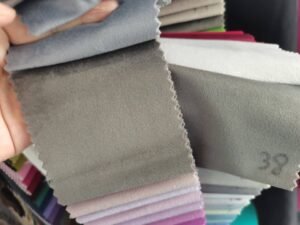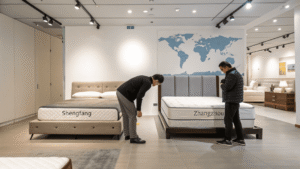How to Validate Production Capacity of Mattress Manufacturers in China?
You’re planning a bulk mattress order, but you can’t afford late shipments or empty promises. You need proof, not just sales talk.
A real mattress factory should provide verified output data, such as shipment records, audit certifications, and factory videos, showing it can produce at least 10–40 containers monthly.

A good product means nothing if it never ships on time. That’s why validating your supplier’s actual mattress output is critical before placing large orders. Don’t rely on a sales manager’s words — demand real proof.
How much production volume should a serious mattress factory handle monthly?
You don’t want delays, and you don’t want to get stuck with a supplier that bites off more than it can chew.
Mid-size factories typically handle 10–25 containers/month, while large operations exceed 40 containers. Ask for actual shipment logs, Bills of Lading, or Alibaba backend records to verify.

What Volume Says About the Factory
If a supplier claims big numbers but can’t show past shipment history, that’s a red flag. Reliable factories will share shipment records, or even better, B/L samples. In my case, I always show recent export logs and offer contacts from repeat clients to back it up.
Here’s a basic reference chart for mattress output:
| Factory Size | Monthly Output (Containers) | Typical Team Size | Notes |
|---|---|---|---|
| Small Workshop | 1–5 | <30 workers | May outsource key processes |
| Mid-size Factory | 10–25 | 50–100 workers | Standard OEM capability |
| Large-Scale Plant | 40+ | 100–300+ workers | Full automation, fast lead time |
How can I confirm a factory’s real production capacity without visiting China?
Not everyone can fly to China to audit a factory. So how do you verify remotely?
Request factory videos, shipment logs, sample production timelines, and third-party certifications. These give you a clear picture without stepping foot in the country.

What I Provide for Remote Buyers
When I work with buyers like Karim from Australia, I always offer high-res videos of our factory floor — from foam cutting and quilting to packaging and container loading. I also share screenshots of past Alibaba transactions, export summaries, and real packaging lines in operation. These reassure buyers they’re dealing with a real manufacturer.
| Remote Proof Type | Purpose |
|---|---|
| Factory floor videos | Visual confirmation of in-house production |
| Production log exports | Shows recent order size + timelines |
| B/L or shipping reports | Verifies past export volume |
| Team roster screenshots | Confirms staffing scale |
What documents verify manufacturing capabilities in China?
If a factory really has capacity, they’ll have paperwork to prove it. No serious supplier operates without records.
Request: production capacity report, staff count list, machine inventory, factory license, and export performance. These give you a 360° view of the factory’s true ability.

What I Show Buyers
Every time I’m asked about capacity, I send a zip file that includes our:
- Workforce count by department
- Monthly production stats in Excel
- Foam and spring machine photos
- Factory license & ISO certificate
This is standard. If another supplier can’t send that in one day, they may be hiding something.
How can I tell if a Chinese mattress factory is outsourcing production?
If you care about lead time, consistency, and quality — you need to know what’s made in-house and what’s just “assembled.”
Ask clear questions about in-house steps. Request videos of foam pouring, spring coiling, quilting, and rolling lines. No video = no real production.

What I Recommend You Ask
Many factories buy parts and just assemble. If they only show packing lines or offices, walk away. Here are questions I suggest you ask:
| Key Production Step | What to Ask | What to Look For |
|---|---|---|
| Foam cutting/pouring | “Do you pour your own foam?” | See foam block stacks/machines |
| Spring production | “Are springs made or purchased?” | See coiling machines or storage |
| Quilting & fabric cutting | “Is quilting done in-house?” | Look for computerized quilting |
| Final assembly | “What % is assembled vs. fully produced?” | Ask for full line walkthrough |
What are red flags that a factory is overstating its production capacity?
Not every factory tells the truth. If they can’t prove it, don’t risk your order on assumptions.
Red flags include vague capacity claims, stock photos, inconsistent answers across teams, and no repeat client references. Always validate with documents and photos.

My Experience with Overpromising Sellers
I’ve met suppliers who claimed “50 containers/month” but could barely load 5. Their photos were all stock images. Their timeline kept changing. That’s when I started asking for repeat client contacts, B/Ls, and real-time videos before taking anyone seriously.
Common warning signs:
- Too many stock images
- Different answers from sales vs. manager
- Big price changes without cause
- Delayed responses to simple questions
- No visible production lines
Conclusion
Don’t take a factory’s word at face value. Ask for proof — videos, reports, and timelines. That’s how real capacity is verified.



